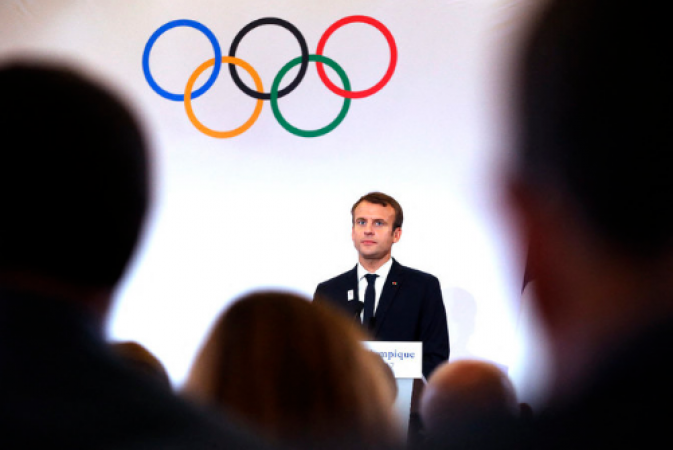
Paris: In a recent interview with sports daily L'Equipe, French President Emmanuel Macron has called for the Russian flag to be banned at the 2024 Paris Olympics, citing Moscow's alleged "war crimes" in Ukraine.
Macron's statements have ignited a debate within the international sports community and raised questions about the role of the International Olympic Committee (IOC) in addressing geopolitical issues within the realm of sports.
During his interview with L'Equipe, President Macron expressed his firm belief that the IOC should take decisive action against Russia in response to what he perceives as "war crimes" committed by Moscow in Ukraine.
He made it clear that, in his view, the Russian flag should not be allowed to fly at the Paris Olympics. "The Russian flag cannot be at the Olympic Games at a time when Russia is committing war crimes," Macron stated emphatically.
He went on to emphasize that the decision should be driven by the conscience of the Olympic world, not the host nation, and that it is crucial for the IOC to act decisively.
The IOC has already taken action against Russia and Belarus by banning their athletes from competing in the 2022 Winter Olympics held in Beijing.
This decision was met with a mix of reactions from both the international community and sports enthusiasts. Some individuals and nations supported the IOC's move, arguing that it was essential to hold Russia accountable for its actions in Ukraine. They saw the ban as a justifiable response to Moscow's alleged involvement in the conflict.
Also Read: PM Narendra Modi's Rousing Welcome by Indian Diaspora in Jakarta
However, others criticized the IOC's decision, contending that it was unfair to punish athletes who had no direct connection to the geopolitical situation.
They argued that the athletes, who have devoted their lives to training and competition, should not be held responsible for the actions of their government. This debate highlighted the complex nature of the relationship between sports and geopolitics.
The IOC now faces the challenging task of deciding whether to take similar action against Russia for the 2024 Summer Olympics in Paris. Macron's recent comments suggest that the French government is pushing for a ban on the Russian flag at the event.
This puts the IOC in a precarious position, as it must navigate a delicate balance between its desire to uphold the Olympic ideals and its responsibility to protect the interests of athletes.
On one hand, the IOC wants to avoid appearing complicit in Russia's actions in Ukraine, given the severity of the allegations. Allowing the Russian flag to be displayed at the Games could be interpreted as a tacit endorsement of Russia's behavior.
On the other hand, the IOC does not want to penalize innocent athletes who have worked tirelessly to qualify for the Olympics and compete on the world stage. The organization must carefully weigh the ethical, moral, and political considerations at play.
The IOC is expected to make a decision regarding Russia's participation in the 2024 Paris Olympics in the coming months. This decision will be closely watched by the international community, sports fans, and, most importantly, the athletes themselves.
The process for arriving at this decision is likely to involve a comprehensive evaluation of the evidence surrounding Russia's alleged war crimes, as well as consultations with various stakeholders, including member nations, athletes, and human rights organizations.
The IOC, founded on the principles of promoting peace, unity, and fair competition through sports, has often grappled with the intersection of sports and politics.
Historically, the organization has sought to maintain the neutrality of the Olympic Games, striving to provide a platform where athletes from all nations can come together in the spirit of sportsmanship. However, as the world becomes increasingly interconnected, it is becoming more challenging for the IOC to insulate itself from geopolitical events and moral dilemmas.
Also Read: Greek Shipping Company Admits Guilt in Smuggling Iranian Crude Oil, Faces $2.4 Million Fine
The IOC's decision in this matter will set a precedent for how international sports organizations address political issues in the future. It will also shape the way the world perceives the Olympic Games and their ability to remain a symbol of unity and sportsmanship.
As the world eagerly awaits the IOC's verdict, the debate over the Russian flag's presence at the 2024 Paris Olympics serves as a reminder of the complex relationship between sports and global politics.